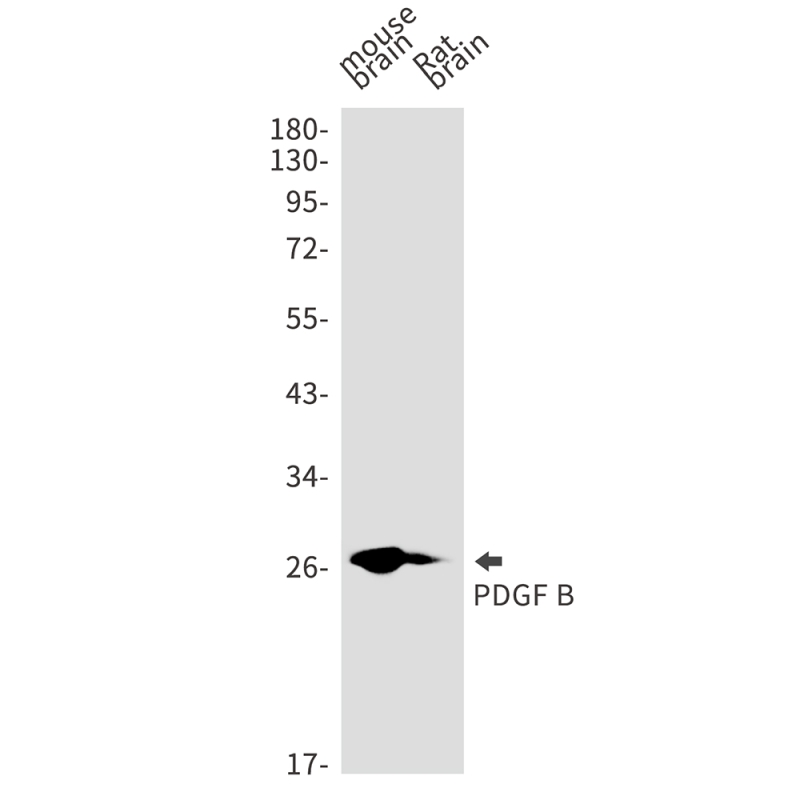
| WB | 1/500-1/1000 | Human,Mouse,Rat |
| IF | 咨询技术 | Human,Mouse,Rat |
| IHC | 1/50-1/100 | Human,Mouse,Rat |
| ICC | 技术咨询 | Human,Mouse,Rat |
| FCM | 咨询技术 | Human,Mouse,Rat |
| Elisa | 咨询技术 | Human,Mouse,Rat |
| Aliases | PDGFB; PDGF2; SIS; Platelet-derived growth factor subunit B; PDGF subunit B; PDGF-2; Platelet-derived growth factor B chain; Platelet-derived growth factor beta polypeptide; Proto-oncogene c-Sis; Becaplermin |
| Entrez GeneID | 5155 |
| WB Predicted band size | Calculated MW: 27 kDa; Observed MW: 27 kDa |
| Host/Isotype | Rabbit IgG |
| Antibody Type | Primary antibody |
| Storage | Store at 4°C short term. Aliquot and store at -20°C long term. Avoid freeze/thaw cycles. |
| Species Reactivity | Human,Mouse,Rat |
| Immunogen | A synthetic peptide of human PDGF B |
| Formulation | Purified antibody in TBS with 0.05% sodium azide,0.05%BSA and 50% glycerol. |
+ +
以下是3篇关于PDGF B抗体的研究文献概览(标题、作者及摘要核心内容):
---
1. **标题**: *"Targeting PDGF-B signaling by neutralizing antibody mediates antitumor immunity in colorectal cancer"*
**作者**: Li X et al.
**摘要**: 研究证明抗PDGF-B单克隆抗体通过阻断PDGF-B/PDGFRβ信号通路,抑制结直肠癌肿瘤微环境中免疫抑制性细胞(如TAMs和CAFs)的活化,增强抗肿瘤T细胞反应,延缓肿瘤进展。
---
2. **标题**: *"Neutralizing PDGF-BB suppresses arteriosclerosis by smoothing muscle cell phenotypic modulation"*
**作者**: Chen Y et al.
**摘要**: 在小鼠动脉粥样硬化模型中,抗PDGF-BB抗体通过抑制血管平滑肌细胞向合成表型转化,减少血管壁炎症和斑块形成,提示其作为动脉硬化治疗的潜在策略。
---
3. **标题**: *"Anti-PDGF-BB therapy promotes diabetic wound healing via angiogenesis and collagen deposition"*
**作者**: Zhang R et al.
**摘要**: 该研究利用抗PDGF-BB抗体干预糖尿病小鼠皮肤创面,发现其通过促进内皮细胞增殖和胶原重塑,显著加速伤口愈合,为糖尿病并发症治疗提供新方向。
---
4. **标题**: *"PDGF-B blockade inhibits liver fibrosis via disrupting stromal niche formation"*
**作者**: Henderson NC et al.
**摘要**: 在肝纤维化模型中,抗PDGF-B抗体阻断了肝星状细胞活化及细胞外基质沉积的关键信号,证实靶向PDGF-B可有效抑制纤维化进程并促进组织修复。
---
以上文献均聚焦于PDGF-B抗体的靶向治疗潜力,涵盖肿瘤、血管疾病、伤口修复及纤维化等方向。
Platelet-derived growth factor B (PDGF-B) is a key member of the PDGF family, a group of growth factors involved in cell proliferation, migration, and angiogenesis. Encoded by the PDGFB gene, PDGF-B exists as a dimeric protein (commonly forming PDGF-BB homodimers or PDGF-AB heterodimers) that binds to tyrosine kinase receptors (PDGFR-α and PDGFR-β), activating downstream signaling pathways like MAPK and PI3K/Akt. It plays critical roles in embryonic development, tissue repair, and vascular homeostasis. Dysregulated PDGF-B signaling is implicated in pathologies such as cancer (promoting tumor angiogenesis and stromal activation), atherosclerosis, and fibrotic disorders.
PDGF-B antibodies are essential tools for studying its expression, localization, and function. These antibodies, often monoclonal or polyclonal, are designed to detect PDGF-B via techniques like Western blotting, immunohistochemistry (IHC), or immunofluorescence (IF). Neutralizing antibodies can block PDGF-B/PDGFR interactions, enabling research into its pathological roles or therapeutic targeting. For instance, PDGF-B inhibition is explored in anticancer therapies to disrupt tumor vasculature or in antifibrotic treatments. Specific clones are validated for cross-reactivity across species (human, mouse, rat) and applications, ensuring reliable experimental outcomes. Commercial antibodies typically provide data on specificity (e.g., absence of cross-reactivity with PDGF-A) and optimal dilution ranges. Researchers also use PDGF-B antibodies in disease models to correlate protein levels with progression or treatment responses, advancing insights into its dual roles in physiology and disease.
×